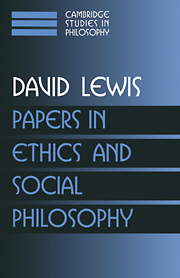Book contents
- Frontmatter
- Contents
- Introduction
- 1 Semantic analyses for dyadic deontic logic
- 2 A problem about permission
- 3 Reply to McMichael
- 4 Why ain'cha rich?
- 5 Desire as belief
- 6 Desire as belief II
- 7 Dispositional theories of value
- 8 The trap's dilemma
- 9 Evil for freedom's sake?
- 10 Do we believe in penal substitution?
- 11 Convention: Reply to Jamieson
- 12 Meaning without use: Reply to Hawthorne
- 13 Illusory innocence?
- 14 Mill and Milquetoast
- 15 Academic appointments: Why ignore the advantage of being right?
- 16 Devil's bargains and the real world
- 17 Buy like a MADman, use like a NUT
- 18 The punishment that leaves something to chance
- 19 Scriven on human unpredictability (with Jane S. Richardson)
- Index
17 - Buy like a MADman, use like a NUT
Published online by Cambridge University Press: 24 December 2009
- Frontmatter
- Contents
- Introduction
- 1 Semantic analyses for dyadic deontic logic
- 2 A problem about permission
- 3 Reply to McMichael
- 4 Why ain'cha rich?
- 5 Desire as belief
- 6 Desire as belief II
- 7 Dispositional theories of value
- 8 The trap's dilemma
- 9 Evil for freedom's sake?
- 10 Do we believe in penal substitution?
- 11 Convention: Reply to Jamieson
- 12 Meaning without use: Reply to Hawthorne
- 13 Illusory innocence?
- 14 Mill and Milquetoast
- 15 Academic appointments: Why ignore the advantage of being right?
- 16 Devil's bargains and the real world
- 17 Buy like a MADman, use like a NUT
- 18 The punishment that leaves something to chance
- 19 Scriven on human unpredictability (with Jane S. Richardson)
- Index
Summary
When theoreticians think about nuclear deterrence, often they focus on a nasty choice between two rival package deals. The two have gone by various names over the years, but let me take the paired epithets: MAD (Mutual Assured Destruction) versus NUTS (Nuclear Use Theorists). Each package is a bundle of policies: centrally, policies for the procurement of strategic nuclear forces and conditional intentions about how to use those forces in case of war. I think we can break up the packages and keep only part of each. What we get may be in some sense MAD and in some sense NUTS – for the terms are elastic – but I hope it is the better half of both.
In a debate between MAD and NUTS, each side may say that the other's policies involve a twofold risk: a grave moral risk of committing massacres and a grave prudential risk of inviting and undergoing massacres. If they say so, they are right. The contest between these two repugnant alternatives gives nuclear deterrence itself a bad name. How does the very idea of nuclear deterrence turn into the nasty choice between MAD and NUTS? Does it have to happen? Is there no way around it?
MAD: IF YOU CAN'T BE CREDIBLE, BE DREADFUL
To trace the reasoning that drives us MAD, start with a simple conception of nuclear deterrence. We deter the enemy from doing X by threatening that if he does, then we will punish him by doing Y.
- Type
- Chapter
- Information
- Papers in Ethics and Social Philosophy , pp. 219 - 226Publisher: Cambridge University PressPrint publication year: 1999



